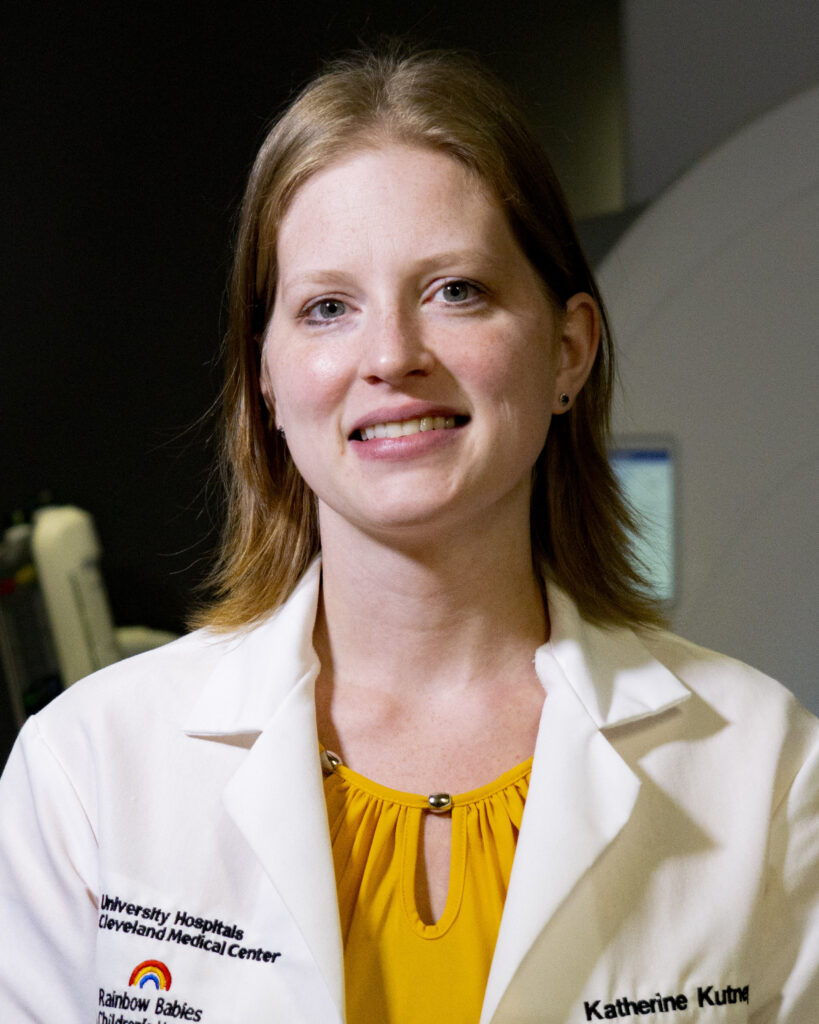About 5,000 children and teens in the United States are diagnosed with type 2 diabetes each year, and the rate is increasing about 5% annually, putting thousands of children at risk for diabetic kidney disease (DKD).
While DKD is still considered relatively rare in children, Katherine Kutney, an assistant professor of pediatrics at Case Western Reserve University, expects cases to increase from pandemic-induced obesity—the lack of physical activity, more time spent stationary in front of computer screens.

But DKD in children may be slowed with medication therapy if signs of the disease can be detected early and monitored—the goal of new research Kutney will pursue with a 2021 Hartwell Individual Biomedical Research Award.
Kutney, also a pediatric endocrinologist at University Hospitals Rainbow Babies & Children’s Hospital, was awarded a coveted research grant from The Hartwell Foundation for “Monitoring the Progression of Diabetic Kidney Disease with Multimodal Magnetic Resonance Imaging.”
The Hartwell Foundation is a Memphis-based philanthropic institution that funds innovative biomedical research to benefit children of the United States. Kutney was one of 10 researchers representing eight institutions to receive recognition as Hartwell Investigators.
The 2021 award provides each recipient $300,000 in direct research costs over three years.
“It means a lot. It gives me the time and resources to do this research, which would be extremely difficult without The Hartwell Foundation support,” said Kutney, whose expertise includes cystic fibrosis-related diabetes, type 1 and type 2 diabetes, growth disorders, liver disease and thyroid disorders. “The Foundation will also put me in touch with a national network of early-stage researchers and provide a support network to help me grow as a scientist and opportunities for collaboration in the future.”
By winning the Individual Award, Case Western Reserve also qualifies to receive a Hartwell Fellowship providing postdoctoral support for two years at $50,000 direct cost per year to a candidate the university chooses who holds a PhD or equivalent doctorate to pursue further specialized training in biomedical research.
The disease
DKD is caused by chronically high levels of blood sugar in type 2 diabetes, a disorder characterized by insulin resistance, insufficient insulin production and an inability to convert glucose into energy.
Early-stage kidney disease usually has no symptoms, but the effect of elevated blood sugar can cause permanent damage to the eyes, blood vessels, nerves and kidneys. By the time type 2 diabetes is diagnosed in children, 10-30% will already have signs of kidney damage, and more than half will develop chronic DKD within 15 years.
Kutney’s approach
Unfortunately, screening tests don’t accurately detect early kidney disease or predict which patients will develop kidney failure.
Magnetic resonance imaging, or MRI, is a medical imaging technology that uses a magnetic field and radiofrequency pulses to generate information about the human body. Multimodal MRI refers to the use of various types of MRI scan to detect different features of organ disease. The three types of MRI to be used in Kutney’s awarded research proposal include imaging to measure structural changes, tissue blood-oxygen levels and renal blood flow.
The Hartwell Foundation’s commitment
Each year The Hartwell Foundation invites a limited number of institutions nationally to hold an internal open competition to nominate candidates from their faculty who are involved in early- stage, innovative and cutting-edge biomedical research that has not yet qualified for significant funding from outside sources and has the potential to benefit children of the United States.
“In our 16th year supporting innovative, early-stage biomedical research with the potential to benefit children, the 2021 competition for Individual Biomedical Research Awards once again proved to be exceptional,” said Hartwell Foundation President Fred Dombrose. “Nominees who received an award leveraged internal support and guidance from their participating institution, as well as the experience of previous Hartwell Investigators.”
For more information, contact Bill Lubinger at william.lubinger@case.edu.


